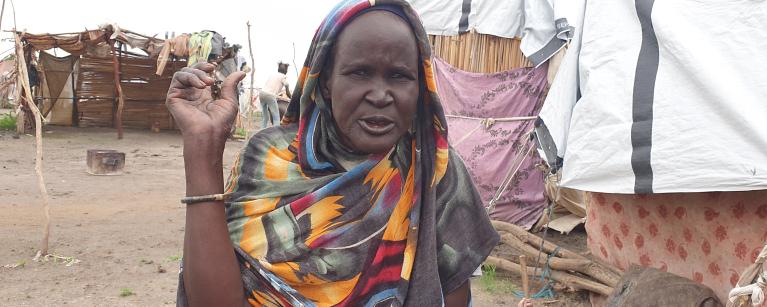Amid the raging conflict in Sudan, thousands of people continue to flee in desperate need of safety and protection. Over 3.9 million people, mostly women and children have been displaced within Sudan and in the neighboring countries Chad, South Sudan, Egypt, Ethiopia, and the Central African Republic.
Among them, we meet 53-year-old Nyakoro Majok, from Abyei in South Sudan. Nyakoro, a twice displaced returnee in Renk, has been at the Renk transit center, a location designed to temporarily host those displaced as they await help to return to their previous home or stay with family.
With the arrival of the rains, Nyakoro was forced to set up temporary shelters using straws and plastic sheets which now serve as her last line of defence against the ravages of torrential rains and the scorching sun.
“My family and thousands of other families have been living in the open until we bought this tent with the money we got,” says Nyakoro referring to cash she recently received from a program that Oxfam runs.
Over the past months, Nyakoro and her family have spent most of their days pacing between shelters and the transit center in search of food. This has been a reality for Nyakoro and 30,000 others currently at the different sites near the Transit center.
For Nyakoro, her only pair of shoes got damaged during the trip across the border into South Sudan.
“I walked barefoot for several weeks. It never was the priority at the time because we only needed to leave and find safety.”
With support from the Scottish Government, Nyakoro’s family was among 700 other households who received unconditional cash to buy priority items that they could not receive from humanitarian agencies.
“I received 90,000 SSP (about $100) from Oxfam. I used the money to buy bread and plastic sheets and after 3 days, I erected a shelter” says Nyakoro, adding “I did not bring shoes from Sudan but with the money I received, I also bought jackets and sandals.”
Within the Renk transit center, Nyakoro’s story is like that of other thousands of families fleeing the crisis with nothing to start a life as they hastily departed Sudan, fast and in a hurry.
In June 2023, with support from the Scottish Government, Oxfam South Sudan began the distribution of funds to the returnees, targeting an initial 700 households.
By September, thousands of South Sudanese have so far already managed to cross the border. But with no end in sight to Sudan’s civil war, many more people are expected to try and make the difficult journey south.
An estimated 9.4 million people – 76% of South Sudan’s population – require aid with the situation further exacerbating the humanitarian situation.
